
grapplingstars.com, femcompetitor.com, fciwomenswrestling.com, fcielitecompetitor.com fciwomenswrestling2.com articles, pexels.com Ivan-Oboleninov
Similar to a group of girls clad in bikinis on a beach, rope in hand, grimacing and pulling against one another, the emotions of denial and acceptance find themselves in a constant tug of war.
Only it’s not so pretty.
Unlike different groups of submerged animals in hibernation, the two feelings absolutely cannot co-exist.
In your personal life, caught in the middle of this wrenching tug of war, at some point you have to pick one or the other.
As we traverse the voluntary stepped on and involuntary land mines of life at some point we come face to face with tragedy. We can’t avoid it.
That being the case, we tend to have two choices. Go into denial and stay there or slowly accept what we cannot change.
The quietly explosive scenarios are a plenty. What are some of them?
Please brace yourself.
The loss of a child, mate abandonment, death of a spouse, being laid off from a unique great high paying job, transition into middle age, cancer and the impending expiration, the beauty and fun of your teenage years gone forever and replaced by mediocrity in another time period where others do not see you as important and more.
When the emotional sign posts occur, do you move towards acceptance or stay in denial?
“Acceptance doesn’t mean resignation; it means understanding that something is what it is and that there’s got to be a way through it.”… Michael J. Fox
Do you need help deciding?
Why don’t we let the experts at Psychology Today help guide us?
In his June 2015 article Acceptance – It Isn’t What You Think, William Berry, LMHC shared, “There is a movement in psychology, positive psychology more accurately, toward radical acceptance, focusing on gratitude, and resonating with the positive.
New theories of therapy have been developed with acceptance as the main focus.
Acceptance has been a key to happiness since Buddhism was born. The Second Noble Truth of Buddhism (of The Four Noble Truths) is that desire (or craving) is the root of all suffering.
Acceptance has been a cornerstone of the 12 Step treatment for alcoholism since the first Alcoholics Anonymous book was written in 1939.”
Very insightful.
His colleague Steven Taylor PH.D. added, in his August 2015 article, How Acceptance Can Transform Your Life, “Often feelings of negativity are caused by an attitude of resistance. Eventually, I formulated a four stage process of acceptance, based on these experiences.”
Here are the four stages that he speaks of:
Stage 1: Become aware of your negative feelings and the thoughts which accompany them.
Stage 2: Give your attention to the reality of your situation. Be mindful of your feelings and your surroundings.
Stage 3: Replace your negative thoughts with conscious positive thoughts.
Stage 4: If there is any resistance left, let go of it. Don’t mentally push the situation away, welcome it. Embrace the situation.
It was fascinating reading.
So that is what is in print but let’s turn our attention to film where art can often imitate life in a very real way.
Since many of those Hollywood Writers and Producers who have packaged those stories for us know of people who have lived through those experiences or they did themselves, in terms of moving from denial towards acceptance, their films can be very insightful.
THE LOSS OF A CHILD
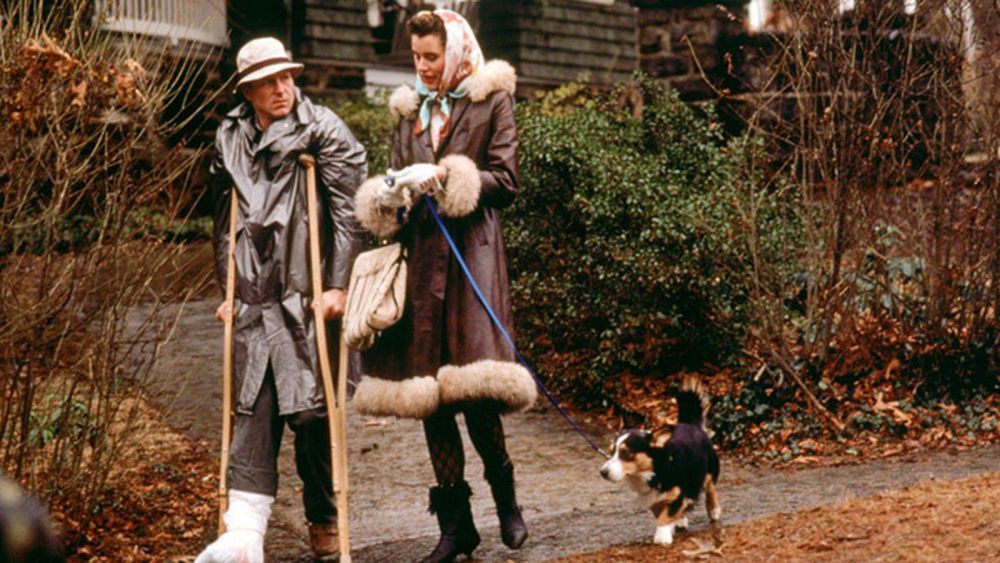
The Accidental Tourist is a 1988 American drama film starring William Hurt, Kathleen Turner, and Geena Davis. It was directed by Lawrence Kasdan and scored by John Williams. The film’s screenplay was adapted by Kasdan and Frank Galati from the novel of the same name by Anne Tyler.
One of the most acclaimed films of 1988, it was nominated for four Academy Awards, including Best Picture, Best Adapted Screenplay, Best Original Score, and Best Supporting Actress for Davis, which she won. John Williams was nominated by the Hollywood Foreign Press Association for Best Original Score.
The storyline goes, after the murder of their young son, the marriage between Macon (William Hurt) and his wife Sarah (Kathleen Turner) disintegrates, and she moves out. After a freak accident puts him on crutches, Macon goes to stay with his quirky siblings at the family home, where he meets the spirited Muriel (Geena Davis), a dog trainer with a young son of her own, with whom he begins a friendship.
Macon comes across as a man who does what many do after a severe tragedy. To lessen the unbearable pain, he steels himself against everything and everyone and essentially becomes dead inside, not feeling anything.
Muriel helps bring him back to life but ultimately it is only when he is willing to accept the gravity and permanence of what has happened is he able to move forward.
Why did his son die in a random shooting? He had the most telling piece of advice for all of us who try and make it through what could be the most painful experience any of us could ever endure.
There is no answer.
Sometimes things just happen for no apparent reason and there is absolutely nothing that we can do about it.
Nor is it our fault.
Afterwards, many spend time being angry at God or searching every emotional nook and cranny trying to figure out what they could have done differently.
It seems only with acceptance that they can painfully move forward even if very slowly.
CHILD ABDUCTION – WHO MAY RETURN
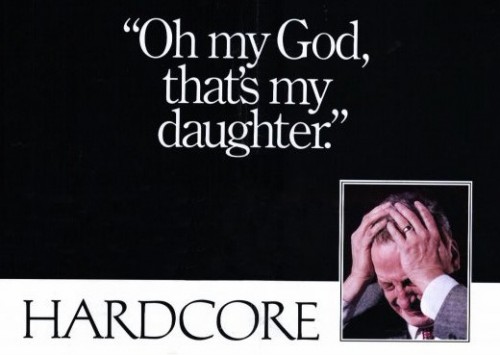
Hardcore is a 1979 American crime drama film written and directed by Paul Schrader and starring George C. Scott, Peter Boyle and Season Hubley. The story concerns a father searching for his daughter, who has vanished.
This film was the innovator and precursor to the myriads of “My Child Has Gone Missing” films to follow.
Jake (Scott) the businessman and father involved, hires a Los Angeles investigator named Andy Mast (Peter Boyle) to look for her.
In these scenarios you privately wonder if the parent actually hopes the child dies a peaceful death as opposed to being found mired in an extremely painful present with no future escape like sex trafficking in a foreign country.
As we travel along with Jake, the closer he seems to get to finding out where his daughter is, the more we sense that he is not going to like what he sees.
We were right on both counts. He finally does find her.
In a pornographic film.
The temptation of any father at this point is to want to kick every body’s butt who had something to do with her fall from grace. The problem is though, as the butt whippings start, with increasing frustration, he doesn’t remotely get closure.
Why not?
Because maybe his daughter’s disappearance is not an abduction or seduction into the lurid at all.
Maybe she left to get away from him.
Can he accept that? Sometimes as a father you have to.
Why do young people join cults? Invariably it has to do with what previously happened in their home.
As Jake, played magnificently by the masterful George C. Scott and other fathers have to deal with once the child is found and the real answer for their departure is revealed, it raises troubling questions.
Do you take responsibility for why the child has left, especially if you still have children in the home who may be experiencing and feeling what she did?
Do you change or do you stay in denial that you may be the reason why she and everyone else temporarily still there in your family wants to leave as well?
Once a parent moves towards acceptance of their role in their child’s downfall and eventual secret departure, the possibilities and pathways towards reconciliation begin.
LOSS OF SIBLING – WHILE YOU ARE PRESENT
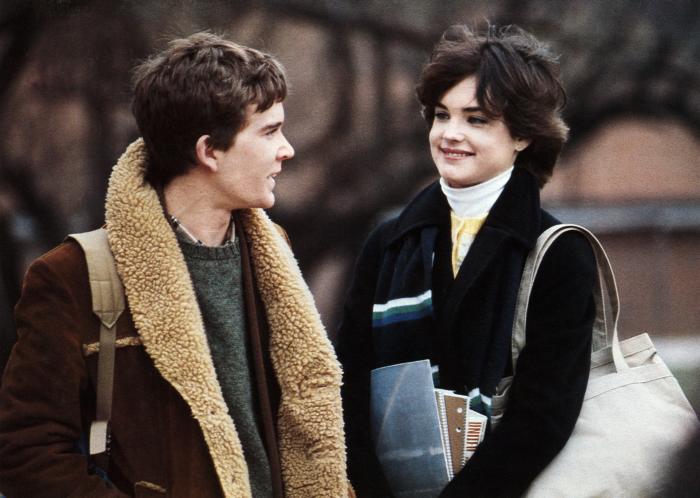
Ordinary People is a 1980 American drama film that marked the directorial debut of actor Robert Redford. The film stars Donald Sutherland, Mary Tyler Moore, Judd Hirsch, and Timothy Hutton.
The story concerns the disintegration of an upper-middle class family in Lake Forest, Illinois, following the death of one of their sons in a boating accident.
The film received six Academy Award nominations and won four. In addition, it won five Golden Globes awards.
We travel forward during the film through the eyes of Timothy Hutton’s character Conrad who lost his arguably more handsome, gregarious and blonde brother during a boating accident while the two were out in rough waters alone.
Being the darling of his mother’s eye, the loss of her handsome son was devastating and inwardly she blamed her more sensitive, less popular and at times awkward son Conrad for the lost.
What strikes us most with Conrad is his inability to even moderately move on from the accident, eventually trying to commit suicide himself.
What is holding him back from living?
It was hard for him to accept that he held on to the boat while his stronger brother could not.
We sense that most of you have seen this film but if you haven’t you should. It’s an excruciating excursion into the realm of understanding why it’s okay to go on living even if a close sibling could not.
LOSS OF YOUR LEADER OF AN IMPORTANT CAUSE
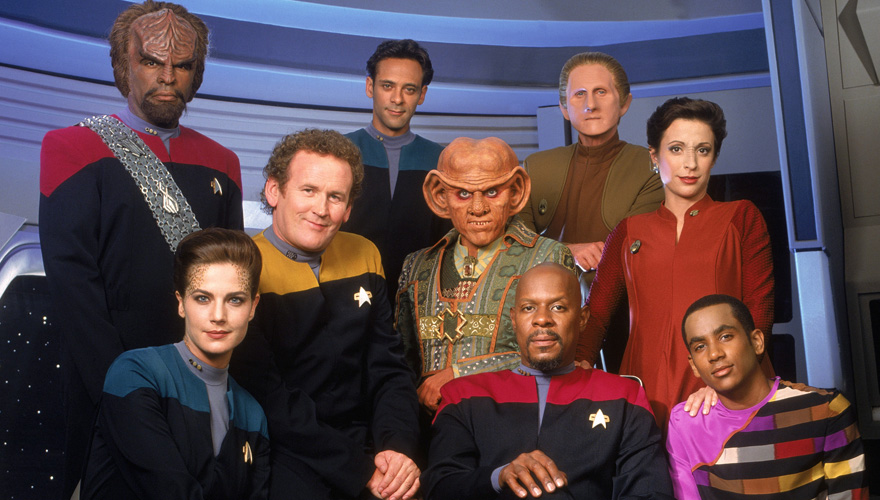
A nation collectively grieves with the loss of an important, charismatic and effective leader.
When an individual has followed a movement paramount to their lives, the loss of their leader can be extremely devastating.
This played out powerfully in the Star Trek Deep Space Nine episode of Life Support.
“Life Support” is the 59th episode of the syndicated American science fiction television series Star Trek: Deep Space Nine, the 13th episode of the third season.
Set in the 24th century, the series follows the adventures on Deep Space Nine, a space station located near a stable wormhole between the Alpha and Gamma quadrants of the Milky Way Galaxy. In this episode, during pivotal negotiations with the Cardassians, Vedek Bareil Antos (Philip Anglim) is severely injured.
As the show opens, a Bajoran transport carrying Kai Winn (Louise Fletcher) and Vedek Bareil (Philip Anglim) suffers a mishap, and Bareil is left injured. He is brought on board Deep Space Nine, where he is treated by Dr. Bashir (Alexander Siddig). They soon, however, find that he is braindead. After Bashir tries to console Major Kira (Nana Visitor), who is also Bareil’s lover, he begins an autopsy. Bashir soon learns that Bareil’s nervous system is still active even though his brain can’t process.
What struck us most when watching this episode is that the doctor, at Kira’s incessant urging, kept performing surgeries to keep Bareil alive but every time he did, a little part of the old Bareil was gone.
At some point, even kept alive, it would be in body only but not in internal makeup.
It was so hard for Kira to accept this, but she finally had to.
How many times in life do we try to keep re-living or reviving something that is clearly dying?
So often the only way to accept its permanent non-existence of something past is to get heavily involved in something else present.
ANGEL HEART – WHERE IS HIS HEART
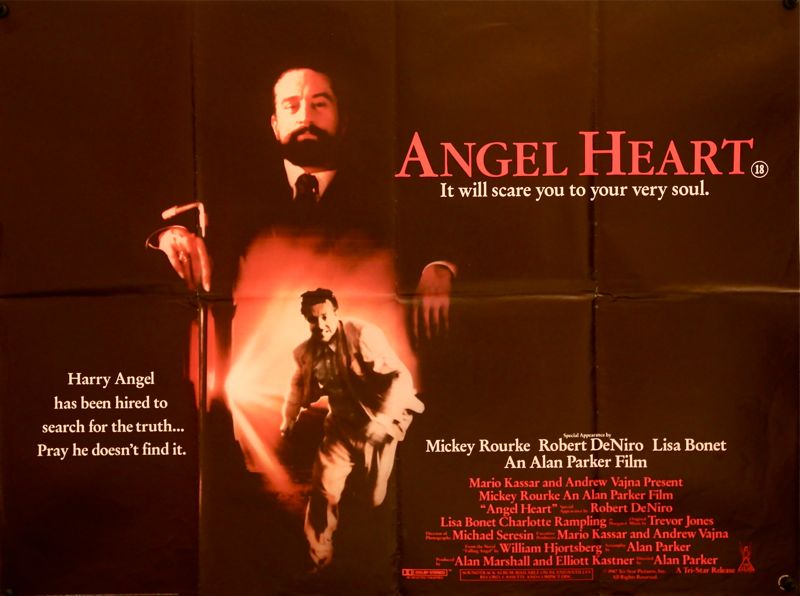
Angel Heart is a 1987 American neo-noir psychological horror film based on William Hjortsberg‘s 1978 novel Falling Angel.
Written and directed by Alan Parker, the film stars Mickey Rourke, Robert De Niro and Lisa Bonet. The story follows Harry Angel (Rourke), a New York City private investigator hired to solve the disappearance of a popular singer known as Johnny Favorite. Angel’s investigation takes him to New Orleans, where he becomes embroiled in a series of brutal occult-related murders.
As the expression goes, the investigation takes a somber turn.
When we travel along with Private Eye Harry Angel, while holding our breath and biting our lip, we begin to sense that something is not quite right with Mr. Angel.
At some point virtually everyone he interviews ends up murdered in a horrendous way.
Is Harry not accepting something? We sense so.
Bruce Willis exemplified the plight of not accepting something crucial in M. Night Shyamalan’s 1999 brilliant masterpiece, The Sixth Sense.
It seems that Angel Heart was the forerunner of not being able to accept that you are already dead.
Before its release, Angel Heart gained controversy for its casting of Lisa Bonet (then known for her pristine role on the family-oriented sitcom The Cosby Show) and her graphic sex scene with Rourke, which faced censorship issues from the Motion Picture Association of America.
Alan Parker was forced to remove ten seconds of sexual content to avoid an “X” rating and secure the “R” rating that the film’s distributor, Tri-Star Pictures, wanted. An unrated version of the film was later released on home video.
Angel Heart received mixed reviews and underperformed at the North American box office, grossing $17 million during its theatrical run.
It has since gained a cult following, with some reviewers calling it one of the best horror films ever made.
We are part of that following.
Seldom have we watched a film that kept you on the edge of your seat knowing there was something very troubling that was submerged swimming parallel to what you were watching but initially it was extremely hard to figure out what it was.
Though he was fiercely resisting what was inevitable, at some point he had to accept his fate.
This is truly a classic.
Thus in that tug of war between denial and acceptance, the first step is to recognize that you are in denial.
Here is how you can by defining it.
As explained in the February of 2016 issue of Psychology Today, “Denial is a psychological defense mechanism used to protect ourselves from painful realities that threaten our self-esteem. It alters reality so that we lose touch with what’s normal. For loved ones it’s a survival device to cope with the broken promises, continuous crises, and embarrassment.”
The leaders at care2.com add, “The truth that we don’t want to hear when we are in denial is that denial only makes the situation worse. Whether we like it or not, there are consequences for our actions and there are also consequences for our inaction. At some point, we have to face our problems — and sooner (rather than later) is usually the best choice.”
If more than one person in your life is bringing your current situation to your attention, how can so many people be wrong?
What is their motivation for bringing it to your attention?
One of the first and most important steps to moving forward is to accept your situation for what it was and as it is.
Then, sometimes with the help of others including a professional, you can begin to develop a plan of action to change.
~ ~ ~
OPENING PHOTO via pureaustin.com
http://www.care2.com/greenliving/conquer-denial-in-5-steps.html
https://www.psychologytoday.com/blog/family-affair/201602/dancing-in-denial-what-its-and-how-stop-it
https://en.wikipedia.org/wiki/Angel_Heart
http://www.imdb.com/title/tt0092563/
https://en.wikipedia.org/wiki/Life_Support_(Star_Trek:_Deep_Space_Nine)
https://en.wikipedia.org/wiki/Hardcore_(1979_film)
https://en.wikipedia.org/wiki/The_Accidental_Tourist_(film)
https://www.brainyquote.com/topics/acceptance
https://www.psychologytoday.com/blog/the-second-noble-truth/201506/acceptance-it-isnt-what-you-think
https://www.psychologytoday.com/blog/out-the-darkness/201508/how-acceptance-can-transform-your-life
https://www.psychologytoday.com/blog/detours-and-tangents/201704/the-slow-path-acceptance



